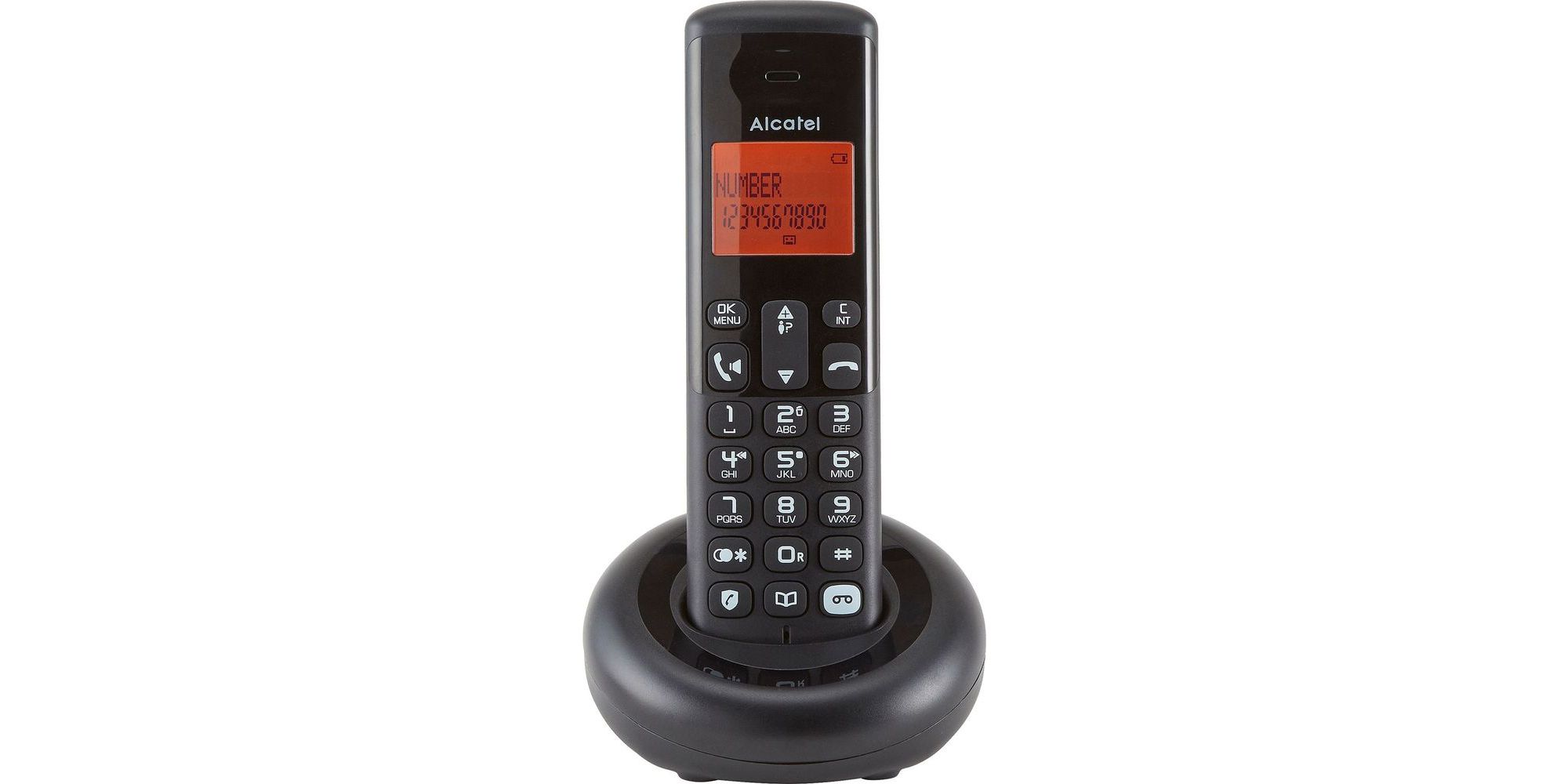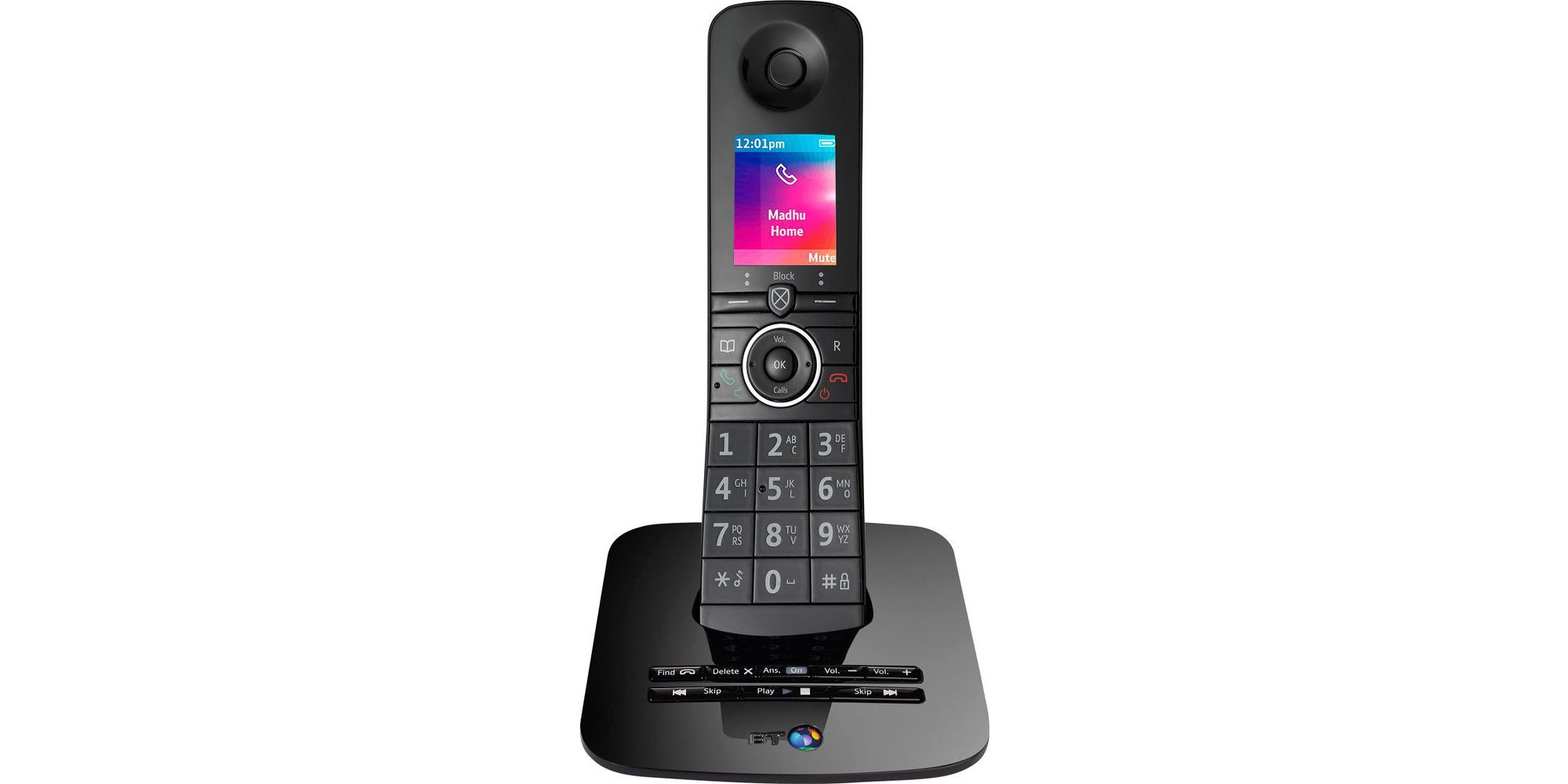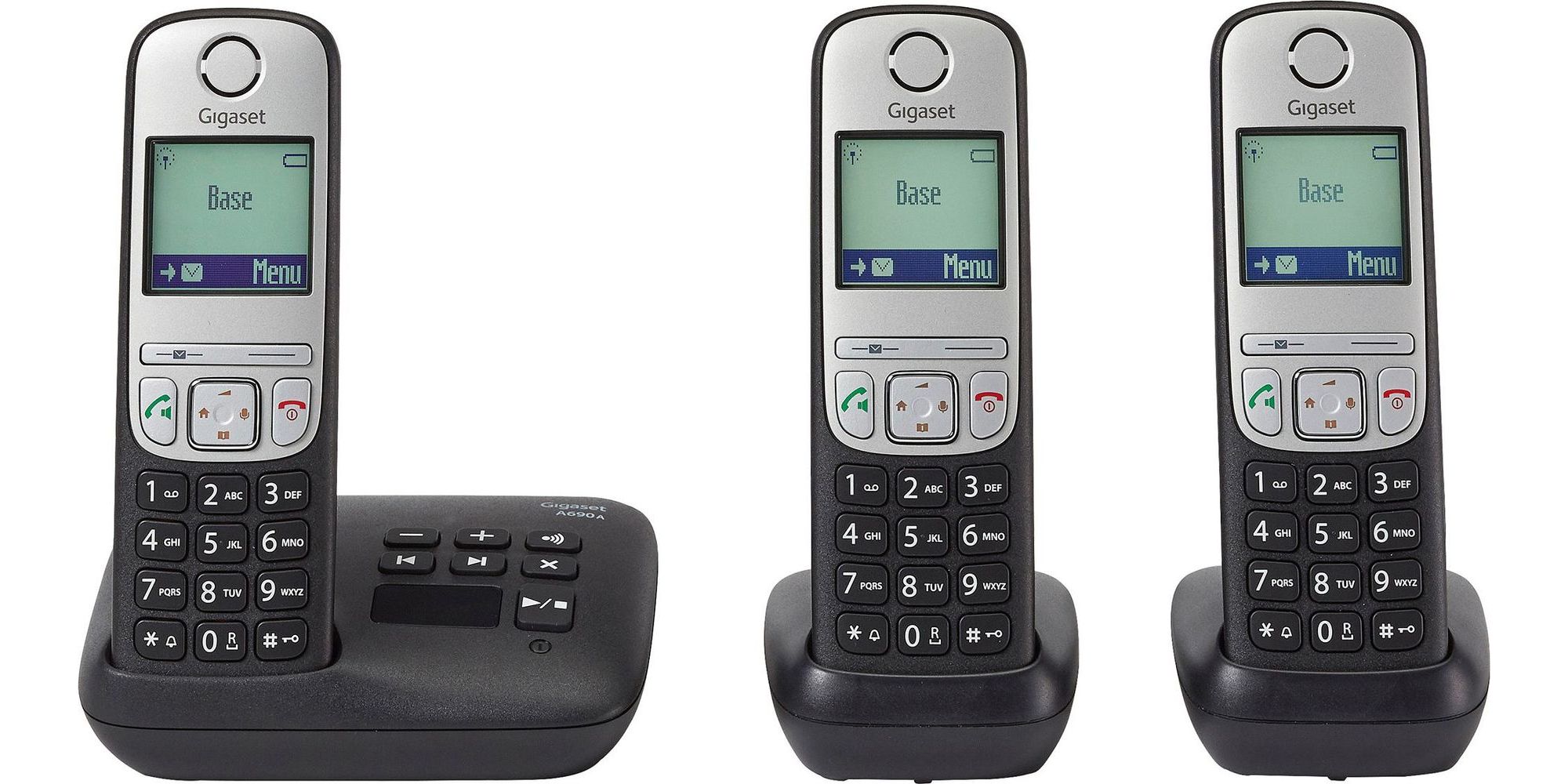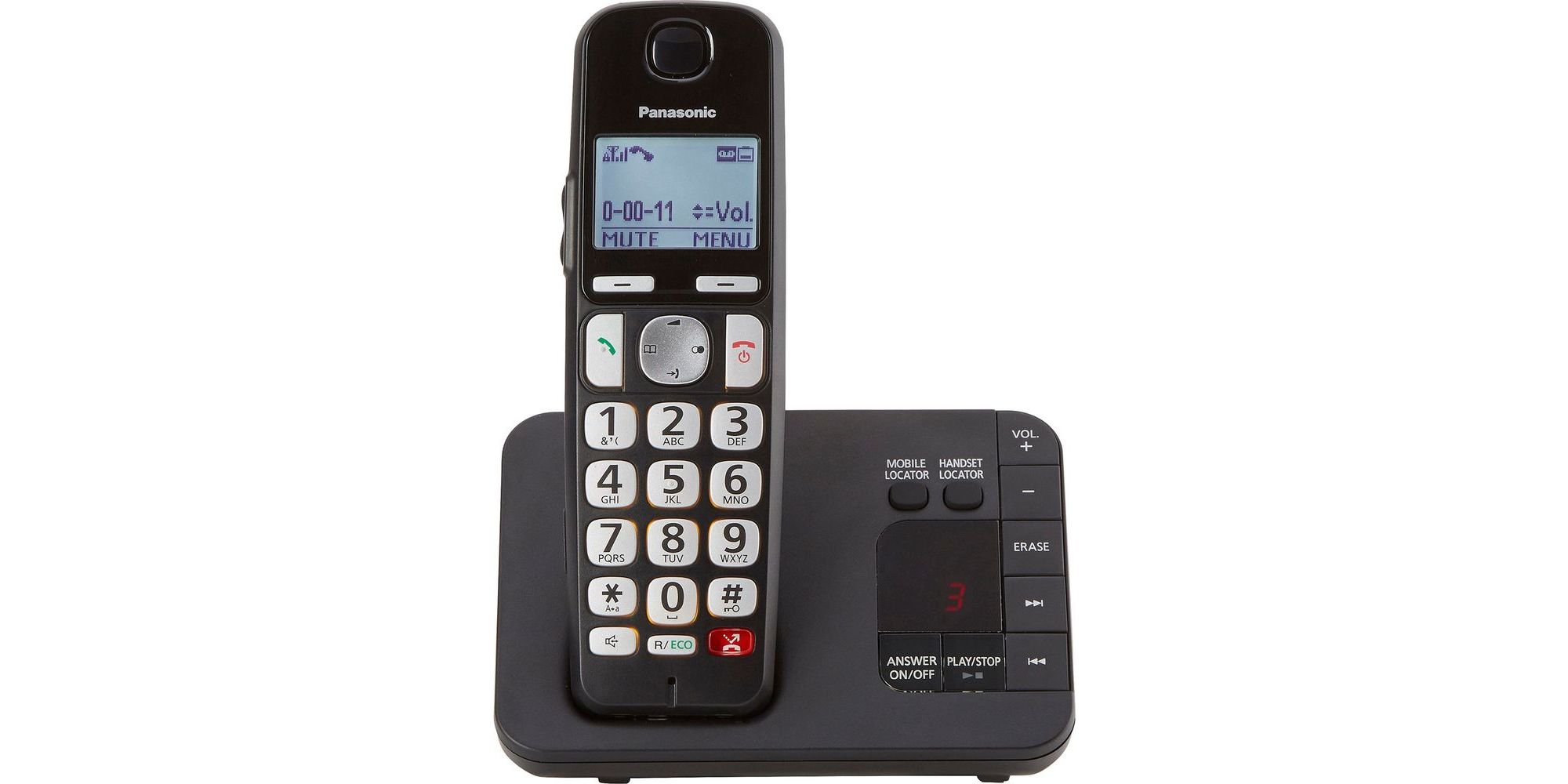By clicking a retailer link you consent to third-party cookies that track your onward journey. This enables W? to receive an affiliate commission if you make a purchase, which supports our mission to be the UK's consumer champion.
Best cordless phones: tested and rated for your home landline

In this article
- The cordless phones we tested
- More cordless phones from our tests
- Which? Don't Buy cordless phones
- How we test cordless phones
- Digital Voice and the landline phone switch-off: what it means for you
- Cold calls – who’s calling me and how to report them?
- Useful extra features for cordless home phones
- Key features for cordless phones for the elderly
Our cordless phone tests mean that we can tell you everything – from call quality and how well they work over long distance, to nuisance call-blocking capabilities and the built-in answering machine – so you can be confident you'll find a cordless phone that suits your needs.
Manufacturers often claim that their phones will work over long distances, typically 50 metres indoors and up to 300 metres outdoors. That may be true in perfect conditions, but it’s unlikely that you’ll manage those distances in your home as walls and other obstacles block the signal.
Plus, we'll tell you about their practical features, including button size, the quality of the LCD screen and ringtone volume. And, if you're after handsets for multiple rooms, discover which models are available in twin, triple and quadruple packs.
How our tests find you the best
We’ve tested 27 cordless phones
They may look similar but our tests have found a wide variation in the quality of different models. We put each through its paces to separate the best from the rest.
Call quality
Calls and messages on the answering machine must be clear. If the line crackles or voices sound muffled and artificial you can't understand what's being said.
Call blocking
Don't waste time on annoying nuisance calls. The best call-blocking phones act like a virtual secretary, but the most basic will only allow you to block specific numbers.
We also test...
The usability of each phone, including adding contacts, the size and placement of buttons, screen quality and the maximum ringtone volume and wireless range.
The cordless phones we tested
The biggest brands and the most popular 15 cordless phones are listed below.
Only logged-in Which? members can view the cordless phone test results.
Join Which? to get instant access to our test results and Best Buy recommendations.
| Phone | Price | Score | Sound quality | Ease of use | Range | Call blocking |
|---|---|---|---|---|---|---|
Sign up to reveal Get instant access to this and all our scores and recommendations Unlock tableDigital £8.99 per month, cancel any time. Already a member? Log in | 88% | |||||
| 82% | ||||||
| 82% | ||||||
| 80% | ||||||
| 80% | ||||||
| 78% | ||||||
| 78% | ||||||
| 77% | ||||||
| 75% | ||||||
| 75% | ||||||
| 73% | ||||||
| 72% | ||||||
| 68% | ||||||
| 67% | ||||||
| 64% |
Sign up to reveal
Get instant access to this and all our scores and recommendations
Unlock tableDigital £8.99 per month, cancel any time.
Already a member? Log in
Date tested: June 2025, March 2024, June 2023, July 2021, October 2019, March 2019, September 2018, April 2018, July 2016 and September 2015. Page last checked: July 2025. We're not able to show every retailer and cheaper prices may be available. We've tested 27 cordless phones in total, but the table shows our top picks only.
A selection of the cordless phones we tested are listed in alphabetical order below.
Only logged-in Which? members can view the best cordless phones from our tests.
Join Which? to get instant access to our test results and Best Buy recommendations below.
Alcatel E260

Most recently tested June 2025
Number of handsets Single, twin and triple packs available
Need to know Answering machine, speed dial, not hearing-aid compatible, number blocking (withheld and unavailable numbers), saves 50 contacts
BT 4600

Most recently tested October 2019
Number of handsets Single, twin and triple packs available
Need to know Answering machine, speed dial, hearing-aid compatible, number blocking (mobile, international, withheld and unavailable numbers), saves 200 contacts
BT 5960

Most recently tested March 2024
Number of handsets Twin, triple and quadruple packs available
Need to know Answering machine, no speed dial, not hearing aid compatible, number blocking (international and withheld numbers), saves 100 contacts
BT 7660

Most recently tested June 2023
Number of handsets Single, twin, triple and quadruple packs available
Need to know Answering machine, speed dial, not hearing-aid compatible, number blocking (international, withheld and unavailable numbers), saves 100 contacts
BT Advanced Phone Z

Most recently tested April 2018
Number of handsets Single, twin, triple and quadruple packs available
Need to know Answering machine, speed dial, not hearing-aid compatible, number blocking (mobile, international, withheld and unavailable numbers), saves 200 contacts
BT Everyday Phone

Most recently tested April 2018
Number of handsets Single, twin and triple packs available
Need to know No answering machine, speed dial, not hearing-aid compatible, number blocking (international, withheld and unavailable numbers), saves 50 contacts
BT Premium Phone

Most recently tested April 2018
Number of handsets Single, twin and triple packs available
Need to know Answering machine, speed dial, not hearing-aid compatible, number blocking (mobile, international, withheld and unavailable numbers), saves 3,000 contacts
Not sure if a landline phone is still the way to go, but don't want a smartphone? Consider one of the best simple phones instead
Gigaset A690A

Most recently tested June 2021
Number of handsets Single, twin, trio and quad packs available
Need to know Answering machine, speed dial, not hearing-aid compatible, number blocking (withheld and unavailable numbers), saves 200 contacts
Gigaset Family A

Most recently tested June 2023
Number of handsets Single, twin and triple packs available
Need to know Answering machine, speed dial, not hearing-aid compatible, number blocking (withheld and unavailable numbers), saves 200 contacts
Panasonic KX-TGC410EB

Most recently tested October 2019
Number of handsets Single (KX-TGC410EB), twin (KX-TGC412EB) and triple (KX-TGC413EB) packs available
Need to know No answering machine, speed dial, not hearing-aid compatible, number blocking (withheld and unavailable numbers), saves 50 contacts
Panasonic KX-TGD620EB

Most recently tested September 2018
Number of handsets Single (KX-TGD620EB), twin (KX-TGD622EB), triple (KX-TGD623EB) and quadruple (KX-TGD624EB) packs available
Need to know Answering machine, speed dial, not hearing-aid compatible, number blocking (withheld and unavailable numbers), saves 120 contacts
Panasonic KX-TGE820EB

Most recently tested March 2024
Number of handsets Single (KX-TGE820EB), twin (KX-TGE822EB), triple (KX-TGE820EB)
Need to know Answering machine, speed dial, not hearing-aid compatible, number blocking (withheld and unavailable numbers), saves 200 contacts
Panasonic KX-TGJ320EB

Most recently tested October 2019
Number of handsets Single (KX-TGJ320EB), twin (KX-TGJ322EB), triple (KX-TGJ323EB) and quadruple (KX-TGJ324EB) packs available
Need to know Answering machine, speed dial, not hearing-aid compatible, number blocking (withheld and unavailable numbers), saves 250 contacts
VTech CS2050

Most recently tested June 2023
Number of handsets Single (CS2050), twin (CS2051) and triple (CS2052) packs available
Need to know Answering machine, speed dial, not hearing-aid compatible, number blocking (mobiles, international, withheld and unavailable numbers), saves 30 contacts
VTech ES2001

Most recently tested March 2024
Number of handsets Single (ES2000) twin (ES2001) and triple (ES2002) packs available
Need to know No answering machine, speed dial, not hearing-aid compatible, number blocking (international, withheld and unavailable numbers), saves 100 contacts
More cordless phones from our tests
Here’s how the rest of the 12 cordless phones from our tests measured up, listed in alphabetical order.
| Phone | Price | Score | Sound quality | Ease of use | Range | Call blocking |
|---|---|---|---|---|---|---|
| BT 3570 | SQUIRREL_TEXT_50019519 | |||||
| Gigaset A170 | SQUIRREL_TEXT_12876660 | |||||
| Panasonic KX-TGB610EB | SQUIRREL_TEXT_12879459 | |||||
| Panasonic KX-TGC260EB | SQUIRREL_TEXT_50007026 | |||||
Panasonic KX-TGC420EB | Panasonic (£34.99) | |||||
| Panasonic KX-TGC460EB | SQUIRREL_TEXT_50021657 | |||||
| Panasonic KX-TGD320 | SQUIRREL_TEXT_50019518 | |||||
| Panasonic KX-TGE110EB | SQUIRREL_TEXT_12880991 | |||||
| Panasonic KX-TGJ420EB | SQUIRREL_TEXT_12878171 | |||||
| Panasonic KX-TGM420EB DECT | SQUIRREL_TEXT_50021648 | |||||
| Panasonic KX-TGU430EB | SQUIRREL_TEXT_50021650 | |||||
| VTech CS2000 | SQUIRREL_TEXT_50021656 |
Date tested: June 2025, March 2024, June 2023, July 2021, October 2019, March 2019, September 2018, April 2018, July 2016 and September 2015. Page last checked: July 2025. We're not able to show every retailer and cheaper prices may be available.
Which? Don't Buy cordless phones
Our tests uncover the best and the worst. If a product performs so poorly that we think you should avoid it, we name it a Don't Buy and we've tested one cordless phone that is one.
This Don't Buy cordless phone lacks the basic features that most other models have and the sound quality becomes poor as the signal weakens.
To find out which they are, and which dash cams earned our Best Buy and Great Value recommendations, log in or join Which?.
How we test cordless phones

How clear are calls to and from the phone? We make a series of calls from each phone while an expert panel checks the sound quality at both ends of the line. Our experts listen to calls on the speakerphone and assess the sound quality of incoming and outgoing messages left on the answering machine.
How effectively can it block nuisance calls? We test call-blocking capabilities by making calls from various types of phone numbers, to verify that the blocking is working as well as it should. We check whether a handset can block the most common categories of spam calls, including international, mobile, withheld and unavailable numbers.
How easy is it to use? We assess how easy it is to set up the phone, add contacts to the phone book, and make and receive calls. We rate the general handling, including whether the buttons are well spaced, so pressing the right numbers is simple, and whether the names and numbers on the display are easy to read. We also check the maximum volume of the default ringtone from the base station and the handset, so you can make sure you never miss a call.
What's the range like? Our test finds out at exactly what distance the signal drops, so you can work out whether the phone will work in every room in your home. We also note whether the phone will warn the user if the signal is getting too weak before cutting off.
We regularly revisit the cordless phones on sale to see if there are any more popular brands that need testing, and when we find them we do.
Find out more about how Which? is not influenced by product manufacturers or retailers and how your support helps us to stay editorially independent
Digital Voice and the landline phone switch-off: what it means for you
It's arguably the biggest social project since analogue television was retired some 12 years ago: the UK's telephone network is also going digital in January 2027, with the old copper network switched off and replaced with broadband connections instead.
In most cases, the changeover will be simple and free. While some phones might require an adaptor, most will continue working – you'll just have to plug yours into your wi-fi router or a new socket. Once set up, your phone will work in much the same way it always has. You'll be able to keep the same phone number and will still hear a dial tone when you lift the handset. You'll also still have to pay for calls in a similar way – even though they will be delivered using your broadband connection.
BT says that 99% of current phones will work with its Digital Voice service, but some older models may need to be replaced. Reassurances have been made to phone users who don't have or want broadband, with the Openreach network providing a 'dedicated landline service' to those customers.
The switchover may affect other systems in your home that you rely on, such as burglar alarms and telecare devices. In those cases, we'd recommend that you contact your service provider to check on compatibility and whether any further action will be required ahead of the switchover.
To learn more about the changes, read five things to know about the landline switchover.
Cold calls – who’s calling me and how to report them?

Billions of cold calls are made to UK citizens every year, with older and vulnerable people often targeted by the companies making these calls. You may end up being inundated with nuisance calls after giving out your contact details when entering an online competition or answering a lifestyle survey, for example – these details are then sold or shared further by unscrupulous cold-calling firms.
Number spoofing makes it very hard to be certain who’s truly calling you. Our past research has found that nuisance calls originate from thousands of different numbers, as many cold callers regularly change theirs to make it harder to trace, block and prosecute them.
Different bodies are responsible for different types of nuisance calls. For example, complaints about silent or abandoned calls should be passed on to Ofcom, complaints about scam calls should go to Action Fraud and recorded marketing calls to the Information Commissioner’s Office (ICO) or the Telephone Preference Service (TPS).
And if you want to outsmart the fraudsters yourself, then sign up for our free Scam Alerts service to stay ahead of the latest scams and protect yourself.
Useful extra features for cordless home phones
Some of the latest cordless phones are more like mobiles than traditional phones. They come packed with features but can be trickier to use than basic handsets, so think carefully about which features you really need before you buy.
- A Sim-card reader Handy if you've got lots of friends or family members saved on your mobile phone. Simply pop the Sim card from your mobile phone into the reader and you can transfer all your stored numbers directly over to your cordless phone.
- Bluetooth connectivity Bluetooth-enabled home phones can be easily synced to your smartphone, allowing you to share your contacts or to make and receive calls on a different device. You can even pair them with Bluetooth headsets so you don’t have to hold your phone while on a call.
- Phonebook sharing If you plan to buy more than one handset, look for one that enables you to copy the phonebook. Otherwise, you’ll have to type it in on every one. Some phones have a shared phonebook. This means that any time you update the contact details on one handset the others are automatically updated as well.
- Night mode If you don't want to be disturbed, you can set some phones so that they don't ring when there's an incoming call, although some may flash silently. You can usually assign VIP status to certain contacts so that they can get through even when this mode is activated.
Key features for cordless phones for the elderly
If you or a loved one struggles to use a standard home phone because of hearing or sight problems, look out for models that offer the following useful features.
- Hearing-aid compatibility Older analogue hearing aids can be affected by interference from cordless phones. To cut down on interference, look for a phone that’s compatible with hearing aids. This means that it has an inductive coupler, which works directly with a hearing aid to give a clearer sound. To use the inductive coupler, your hearing aid has to be switched to the ‘T’ (telecoil) setting.
- Visual call indicators If you struggle to hear incoming calls, handsets with a visual call indicator, such as a flashing light, can be invaluable. These aren't commonly found on standard cordless phones, so you may have to buy a specialist handset. You can get these from charities such as Action on Hearing Loss or dedicated retailers.
- Loud ringers and volume controls Most phones have a volume control that allows you to boost the sound of the ringtone and the incoming volume of the other caller. You can also get phones that make your own voice louder for the other person.
- Slow playback Some phones allow for slow playback of recorded messages, so that you can take down details more easily.
- Large buttons Specially designed, oversized keys with good contrast between the background colour and the number are easier to use for people with poor eyesight and those with reduced dexterity.
- Keypad with sounds Some phones play an audible beep when a button is pressed and may even have a different sound for each button, helping you dial more accurately. A small number also have talking caller-ID options, announcing who’s calling you so you can decide whether to take the call.
Landline home phone packages: what you need to know

BT is the only major provider that still offers landline-only home phone packages; other providers only include landline packages in a combined deal with broadband.
Upfront, you'll typically pay less per month for pay-as-you-go (PAYG), also known as pay-as-you-talk (PAYT). This is where you only pay the cost of line rental – any calls you make cost extra. The most expensive deals tend to be packages that give you unlimited calls at any time. Generally speaking, the analysis shows that a call plan is more likely to be cost-effective, with only light users likely to be better off with PAYG.
While BT no longer charges differently for daytime, evening and weekend calls in its call packages, some other providers (such as TalkTalk) do. So be sure to consider when you make most of your calls and check what times providers consider to be 'evening'.
There are optional extras that you can add to your landline-only plan, too. These range from withholding your number for calls to three-way calling, international call bundles, and voicemail. These often come with a cost for customers with landline-only packages.
Before deciding on your plan, though, ask yourself one important question: do you even need a landline at all? If you have a mobile deal with lots of inclusive minutes and excellent 5G reception, a landline may simply not be worth the cost.
